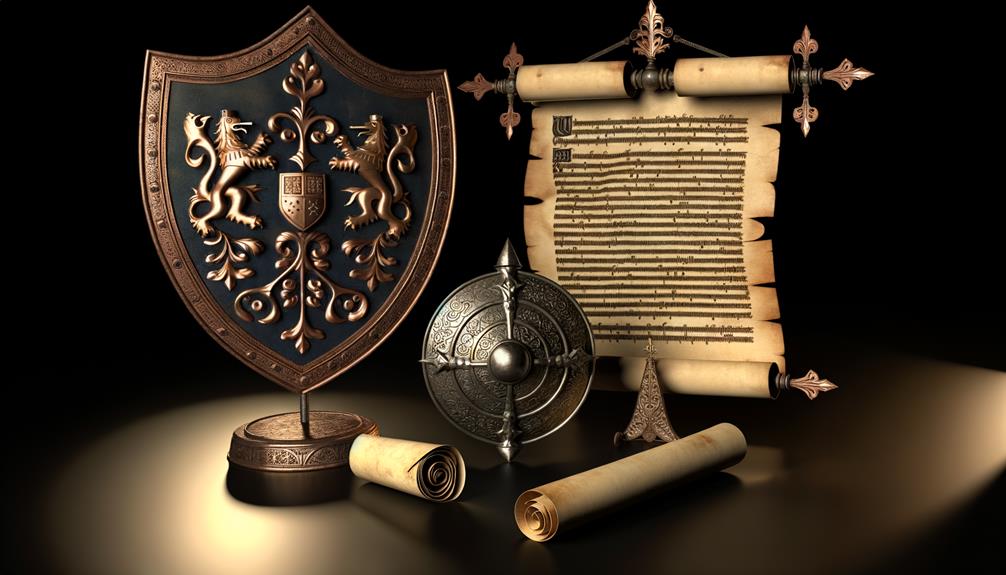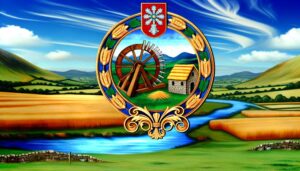Robert Name Meaning and Origin
The name Robert originates from the Old Germanic Hrodebert, combining 'hrod' (fame) and 'beraht' (bright), meaning 'bright fame.' Introduced to England by the Normans in 1066, it became associated with royalty and historical figures such as Robert the Bruce. Its cultural significance underscores ideals of leadership, strength, and nobility, prevalent in literature and folklore.
Famous individuals like Robert Hooke, Robert Kennedy, and Robert Frost have carried this name, exemplifying historical impact and innovation. Today, Robert remains widely used and appreciated for its strong historical roots and dignified resonance.
Discover more about its timeless elegance and versatility.

Key Takeaways
- Robert is derived from Old Germanic elements 'hrod' (fame) and 'beraht' (bright).
- The name means 'bright fame,' emphasizing distinction and renown.
- Introduced to England by Normans in 1066, it has deep historical roots.
- Associated with leadership, strength, and nobility, symbolizing celebrated wisdom.
- Famous figures include Robert Hooke, Robert Kennedy, and Robert Frost.
Meaning of Robert
The name Robert is derived from the Old Germanic elements 'hrod,' meaning 'fame,' and 'beraht,' meaning 'bright,' translating to 'bright fame.' The name Robert has been popular throughout history, with notable figures such as Robert the Bruce, the King of Scotland in the 14th century, and Robert E. Lee, the famous Confederate general during the American Civil War, bearing the name. The history of the name Ryan, on the other hand, is of Irish origin and is derived from the Old Gaelic name Riaghan, meaning “little king.” The name Ryan gained popularity in the United States in the 20th century, and is now a common name for boys.
This etymological construction suggests that individuals named Robert are associated with a legacy of distinction and renown. The dual components of the name emphasize both the luminous quality ('bright') and the enduring impact ('fame') of one's actions or character.
The name has been widely adopted across various cultures and languages, often maintaining its core meaning. The fusion of these elements provides a robust, positive connotation, likely contributing to the name's sustained popularity.
The semantic richness of Robert underscores its suitability for individuals destined for prominent and influential roles in society.
Historical Background
Frequently appearing in historical records, the name Robert has been borne by numerous notable figures throughout centuries, reflecting its longstanding presence and cultural significance. The name Robert can be traced back to the Germanic element hrod, meaning “fame,” and beraht, meaning “bright.” Its popularity can also be attributed to its use by royalty and nobility in Europe. In addition to its historical and cultural significance, the name Robert continues to be commonly used today. Notably, the name Robert has also been influential in the development of surnames, with variations such as Robertson, Roberts, and Robson being derived from it. The Garcia family name history also reflects the widespread use and impact of the name in different cultures and regions. Overall, the enduring legacy of the name Robert speaks to its enduring popularity and significance in human history.
The phrase ‘meaning of aftab in english‘ refers to the translation of the Persian word “aftab,” which means “sun” in English. This is a common practice in linguistics to understand the significance of names and words in different languages.
Originating from the Old Germanic name Hrodebert, meaning 'bright fame,' Robert was introduced to England by the Normans following their conquest in 1066. It gained immediate popularity, partly due to its association with prominent leaders such as Robert the Bruce, the famed Scottish king, and Robert I of Normandy, the father of William the Conqueror.
The name continued to hold sway in medieval Europe and later periods, often associated with nobility and influential statesmen. Its endurance and widespread adoption underscore its deep-rooted historical importance and appeal across various cultures and epochs.
Cultural Significance
Renowned for its historical prominence, the name Robert holds substantial cultural significance across various societies, symbolizing leadership, strength, and nobility. Originating from the Old Germanic elements "hrod" meaning fame and "beraht" meaning bright, Robert encapsulates the ideal of a celebrated and wise leader.
This name permeates through literature, folklore, and legal documents, reflecting its deep-seated reverence. The widespread adoption of the name in medieval Europe highlights its association with royalty and influential figures.
Moreover, in contemporary times, Robert remains a popular choice, signifying enduring qualities of respect and authority. Its consistent usage across centuries attests to the name's unwavering cultural resonance and its embodiment of timeless virtues.
Famous Namesakes
Throughout history, numerous individuals named Robert have left an indelible mark on various fields, from science and politics to arts and literature.
Robert Hooke, a pivotal figure in science, is renowned for his contributions to the field of microscopy.
In politics, Robert Kennedy's legacy as a U.S. Attorney General and his advocacy for civil rights remain influential.
The literary world remembers Robert Frost, whose poetry has become emblematic of American literature.
In the arts, Robert Redford's achievements as an actor and director have greatly shaped modern cinema.
These Roberts exemplify the name's historical impact, demonstrating its association with innovation, leadership, and creativity across diverse domains.
Modern Usage
In contemporary society, the name Robert continues to be widely used, maintaining its presence across diverse cultures and generations. The name's enduring appeal can be attributed to its classic charm and timeless elegance.
Statistical data indicate that Robert frequently appears in birth registries, signifying its sustained popularity. Moreover, the name's versatility allows it to seamlessly integrate into various linguistic and cultural contexts.
While modern trends often lean towards more unique or unconventional names, Robert remains a steadfast choice, appreciated for its strong historical roots and dignified resonance. Additionally, the availability of various diminutives, such as Rob and Bob, provides flexibility, catering to personal preferences and contemporary naming conventions.
Therefore, Robert remains a relevant and favored choice.
Conclusion
In summation, the name Robert has origins rooted in Old High German, meaning 'bright fame.' It has navigated through centuries of historical significance, cultural reverence, and notable individuals who have carried its mantle. Additionally, the name Robert has been a popular choice throughout various European royal families and has also transcended across borders into English-speaking countries. The meaning of the name Dominic, on the other hand, originates from the Latin word ‘Dominicus,’ which translates to ‘belonging to the Lord.’ Similar to Robert, Dominic has also held significant cultural and historical importance, particularly within the Catholic Church.
Its endurance in modern usage underscores a peculiar human inclination to cling to tradition, perhaps in the hope that one might also be imbued with a semblance of that illustrious brightness.
Indeed, the name Robert stands as a tribute to humanity's undying penchant for nominal grandeur.






